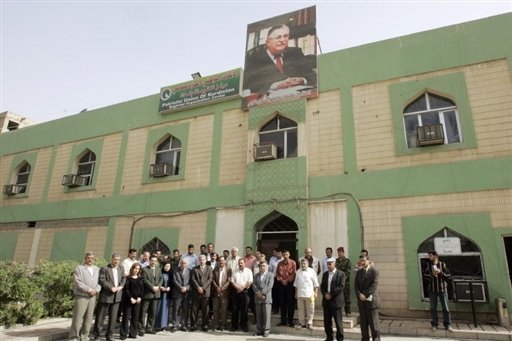
16 december 2008
HALABJA, Iraq (AFP) — Iraqi Kurds mourned on Sunday the deaths of around 5,000 villagers from Halabja who were massacred 20 years ago in chemical attacks blamed on Saddam Hussein's forces during the Iran-Iraq war.

Kurdish villagers, dressed in black, gathered in Halabja for events marking the anniversary of the March 16, 1988 killings, and ceremonies were also held in Baghdad and the main Kurdish city Arbil.
The attack on Halabja was blamed on Saddam's forces, which carried out a series of brutal military assaults in the 1980s in Iraq's northern Kurdish regions.
Victims and their relatives on Sunday renewed their demands for compensation for the losses incurred 20 years ago and that those behind the killings be hanged.
"My three brothers and parents died in the attacks. I am the only survivor from my family," said Suad Hassan, 50. "We want compensation and we also demand that Ali Hassan al-Majid be executed in Halabja."
Majid, the top hatchet man of Saddam who spearheaded the strikes against the Kurds, has been sentenced to death for genocide after he was found guilty of overseeing the killing of 180,000 Kurds in the 1988 so-called Anfal campaign in which around 4,000 villages were attacked.
Last month, Iraq's presidency endorsed the execution of Majid, known to the world as "Chemical Ali" for his propensity to uses poison gases against his opponents, but no execution date has been announced.
His hanging had been delayed due to legal wranglings.
Saddam's regime said the military strikes against the Kurds were a legitimate counter-insurgency operation carried out during Iran-Iraq war.
Halabja victims said the company which supplied Saddam with chemical weapons should also be sued.
"My nine children died in the attacks. I had six daughters and three sons. We want the company which supplied the gas to be prosecuted," said Ahmed Abdallah, 75.
Iraqi Prime Minister Nuri al-Maliki and his ministers observed a minute's silence at his office in Baghdad, while Kurds Arbil held ceremonies and also staged street plays depicting the tragedy.
Government spokesman Ali al-Dabbagh said Iraq was planning to seek compensation from companies and countries which supplied the chemical weapons to the former regime.
"We are also approaching the United Nations to declare March 16 as an international day against chemical arms," Dabbagh said in a statement.
At one of the ceremonies, residents of Halabja unveiled a statue of Omar Hawar, a villager killed with his children while fleeing the attacks.
The statue shows him holding his daughter in his arms, trying to protect her.
Photographs taken in the aftermath of the tragedy were on display at another venue.
At the main ceremony, hundreds of villagers crowded into a hall where community leaders demanded compensation and justice, followed by traditional dancing and folk-singing that expressed the pain of the village, which is still burying victims.
On Friday, villagers laid to rest Ismail Abdallah Rashid, 40, the latest in a still-growing toll of around 5,000 villagers who have so far died. Dozens of others are still suffering the after-effects.
"Ismail had been helping bury the victims of the gas attacks on Halabja when he himself was poisoned by the chemicals. He died on Friday," said Luqman Mohammed, one of the founders of Halabja Victims' Society.
Mohammed said Rashid had suffered severe asthma since the poisoning, which slowly killed him.
Bahar Hassan, 40, a primary school teacher, said the "terrible" events were still fresh in her mind.
"Dozens of children and women were killed by the chemical bombing. Their pain and trauma needs to be addressed," Hassan told AFP.
"We need more private hospitals to deal with the victims who are still suffering."
The Halabja Victims' Society too wants the perpetrators of the gas attacks to be hanged.
"We are demanding that the government execute Ali Hassan al-Majid and his associates," said spokesman Aras Abid.
"We are not concerned whether he is executed in Halabja or not. What is important is that he is executed somewhere in Iraq."


